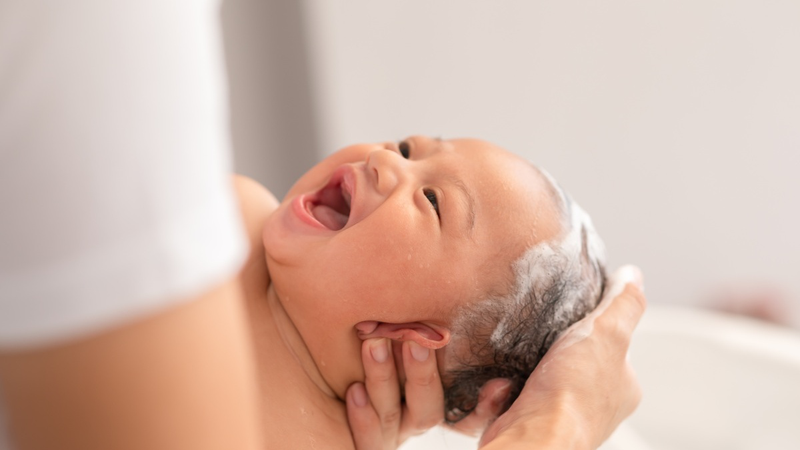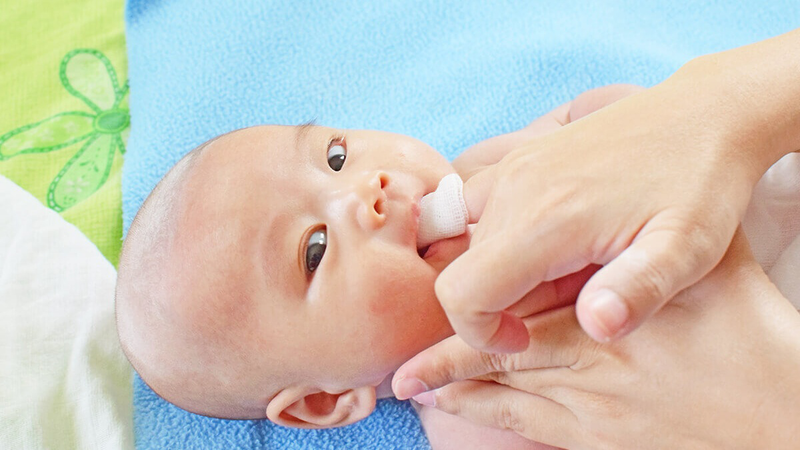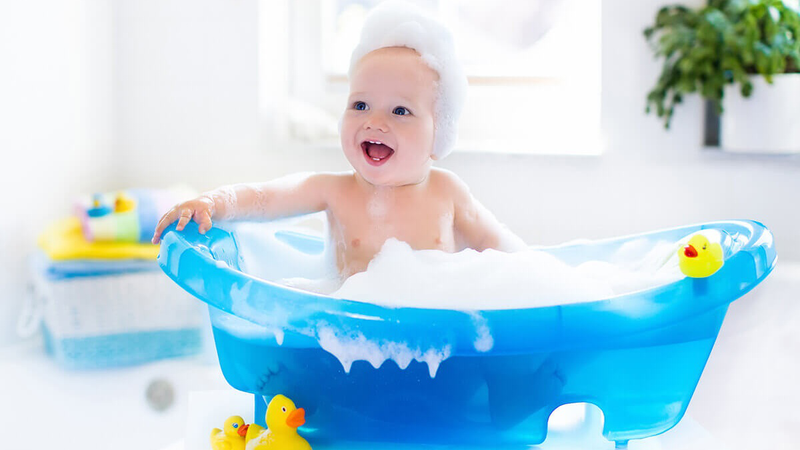How to clean your baby? Which parts need to be cleaned? These questions receive a lot of attention from parents. Especially those who are preparing to enter the journey of becoming a mother for the first time.
Caring for and cleaning your baby in the early stages of life is extremely important. This will help your baby stay fragrant and minimize skin diseases. So how to clean your baby properly?
Methods of cleaning your baby to limit skin diseases
From the moment your baby cries at birth, bathing is the simplest and first method of caring for a newborn. Mothers can prepare the necessary tools to bathe their baby such as a plastic basin, a small chair with soft cloth towels. When bathing your baby, parents should note to use warm water at a temperature of 37 degrees Celsius and avoid using water that is too hot or too cold, which will affect the baby’s skin. Each bath should only last about 5 minutes.

Clean your baby’s skin to avoid skin diseases.
Mothers will use the palm of their hand to take the shower gel and gently massage it onto the baby’s skin. For towels, you need to pay attention to choosing a product that is soft and clean to avoid causing germs for young children. In the first 4 months, babies need to wash their hair every day to remove the callous layer on the scalp.
Take a little shampoo to gently rub on the baby’s scalp and wash gently and cleanly with warm water. Once you have ensured that the baby’s body is clean, you just need to wrap the baby in a soft towel and gently wipe the skin to avoid moisture that causes the baby to get skin-related diseases. The right way to clean the baby will help protect the baby’s skin and body better.
Parts of the body that need to be cleaned for the baby
Below are the parts of the body that mothers need to pay attention to cleaning for the baby.

Some important parts to clean for your baby
Cleaning the baby’s eyes
Newborns have quite weak eyes and their eyelashes often get stuck in their eyes when they wake up. You just need to use a sterile gauze pad soaked in saline to clean your baby’s eyes. Start from the cleanest area to avoid causing mucus in the remaining areas.
Cleaning the baby’s nose
To clean the baby’s nose, you just need to use small cotton pads soaked in saline to wipe regularly. However, you need to pay attention when putting the cotton pad in the baby’s nose. Avoid digging too deep, just do it gently to remove the mucus in the baby’s nose.
Cleaning the baby’s mouth
Newborns have a drier tongue and oral mucosa than adults. This is why babies often have milk residue on their tongue. Accordingly, it will be an ideal environment for bacteria to grow, causing thrush or oral infections in babies. Therefore, mothers should clean their babies right after eating for about 2 hours.

Instructions for proper oral hygiene for infants
Ear hygiene
Your baby’s ears are quite sensitive, so you only need to use a small cotton swab to gently clean inside to avoid puncturing the baby’s eardrum. However, the cotton swab must be dry and not wet to avoid causing ear infections in young children.
Cleaning your baby’s nails
Parents should check your baby’s nails regularly and only cut them when the baby is exactly 1 month old. You should only use nail clippers with suitable round heads and carefully cut both sides of the baby’s nails. This is to avoid excess nail fragments that cause infection. Parents should note that they should not cut their baby’s nails too short, but cut them moderately to avoid damaging the baby’s skin.
Cleaning the baby’s umbilical cord
The umbilical cord of a newborn is often considered an open wound when it has not fallen off. This is also one of the open environments for bacteria to enter and cause infections in young children. Therefore, cleaning the umbilical cord area is extremely necessary. Every day, mothers should clean the baby’s navel area once.
Some things to note when caring for and cleaning newborns
Newborns often have sensitive and vulnerable skin, so the process of caring for and cleaning the baby requires many things to note. Below are some principles that you can refer to.

Things to keep in mind when taking care of young children
Avoid agents that cause irritation for children
Parents should choose clothes or fabrics with soft materials and remove labels. Friction can cause scratches on the baby’s skin, leading to skin inflammation. For soap or detergent, use mild products to suit the baby’s sensitive skin.
Some harmful agents from the environment
After the baby pees or poops, you need to change the diaper quickly. Parents should use mild diaper products that have been clinically proven to minimize irritation on the skin.
Do not let toxic substances come into contact with the baby’s eyes
Newborns’ eyes are quite sensitive and often secrete tears, so they need to be kept away from harmful agents such as cigarette smoke, polluted environments, etc. Using gentle and benign skin and hair care products is important. Parents should avoid using products with high detergents or alcohol that affect the baby’s skin.
Keep the baby’s skin moist
The baby’s skin needs to be kept moist. Especially in dry weather or bathing too much, it can cause the baby’s skin to become dehydrated. To overcome this situation, mothers only need to use mild skin care products on the peeling or dry areas of the baby.
In addition, not changing diapers regularly or in a hot and humid environment will also cause the baby’s skin to become infected with fungus or infection. After changing the diaper, parents need to clean the diaper area with a mild product and dry the baby completely. In addition, mothers should pay attention to keeping the umbilical cord clean and dry to prevent bacteria from entering the baby’s body.
Hygiene methods for babies have been shared in detail in the article above. Hopefully the above information will provide useful reference value for you in your journey of taking care of your baby.





